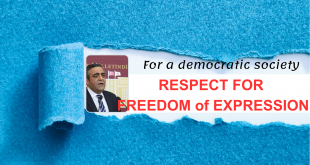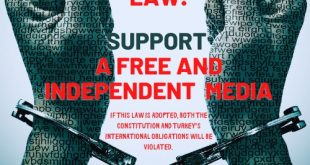In the course of next week, the Human Rights Joint Platform will submit to the President of the GNAT, Mr Bülent Arınç, the proposal for a draft law concerning Article 301 which it has prepared together with the Peace Initiative and the signatures collected in support of it. The proposal is as follows.
Also there is a web site for the IHOP's Freedom of Expression Campaign. www.ihopdusunceozgurlugu.org
TO THE PRESIDENCY OF THE GRAND NATIONAL ASSEMBLY OF TURKEY
Our proposal for a draft law concerning an amendment to the Turkish Penal Code is presented in the annex together with its justification.
We respectfully ask you to take the necessary steps.
Annex:
OVERALL JUSTIFICATION
Many articles of the Turkish Penal Code have been a subject of controversy since 1 June 2005, the date on which it entered into force. Standing at the head of those articles is Article 301, which defines the crime of insulting Turkishness, the Republic and the constitutional institutions and organizations, which was provided for in Article 159 of the former Turkish Penal Code. Examining the historical evolution related to this type of crime, which is regulated in Article 301 of the Turkish Penal Code, which entered into force on 1 June 2005, almost in the same way as the former Penal Code, the following picture emerges. The legal value that the said Article seeks to protect is the prestige and reputation of the constitutional organizations mentioned in the Article. The facts that there is a very thin line between freedom of expression, considered to be the basis of human rights and freedoms today, and this type of crime and that expressions of opinion of the same nature can be regarded sometimes as falling under the scope of freedom of expression and sometimes as constituting an insult according to the subjective perception and evaluation of those who interpret and apply the law have resulted in different practices. It has also been a matter of controversy whether or not a social need is met by this type of criminal provision, which is intensively debated in the doctrine of penal law and which many jurists state to be not conforming to the principle of the “legal definition of crimes.” There is no doubt that the crime regulated in Article 301 is one which is committed usually through the press. The fact that different judgements are made by the courts in relation to opinions which are written or spoken often with the intention of criticism and which should be considered and accepted in the framework of freedom of expression in a democratic society has created damaging effects on social peace. It appears that there is no longer any benefit from keeping in the Turkish Penal Code this type of crime, which accounts for one or two out of every ten thousand criminal proceedings started by public prosecutors in our country, as will be noted through an examination of the judicial statistics for the years 1986 to 2007. Also, it has been observed that individuals prosecuted on charges of committing this crime have been the target of unacceptable reactions from certain quarters of society at the stage of trial due to the nature of the charges brought against them and that the article in question prepares the ground for lynch attempts which are unacceptable in a modern and democratic society. Indeed, our fellow citizen named Hrant Dink, of Armenian origin, who was convicted for this crime by a court judgement, which is debated among jurists, has been murdered as a result of unjust provocations from certain quarters which serve the purpose of damaging peace and security in our country. Certain individuals, not regarding the punishment imposed by court judgement as sufficient retribution for the crime they think has been committed, act on their own concept of criminal justice and take lives. It is a sociological reality that the said article of the law, being open as it is to arbitrary interpretation and application, has its own share in preparing the ground for such killings. It is all too clear that unanimity is usually lacking in court judgements made under the said article; that the jurists specialized in this subject are unable to reach a joint opinion; that although most of the criminal actions brought result in acquittal, the mere fact of bringing a criminal action is considered sufficient in a certain section of the public to regard the individual prosecuted for this crime as guilty; and that results emerge which are contrary to the universal constitutional principle that everyone is innocent until convicted by a final judgement. As a matter of fact, it is known that as a country that violates freedom of expression we face compensation payments ordered by the European Court of Human Rights because sentences imposed under the said article are found contrary to freedom of expression in Article 10 of the European Convention on Human Rights, to which our country is party. Of course, the penal law must prevent hostility between sections of society with different opinions and beliefs, prohibit the fuelling of such hostility, and punish the degradation of individuals on account of their different religion, language and racial or ethnic origins. In fact, this is what Article 216 of the Turkish Penal Code does. However, the actual practice concerning the crime regulated in Article 301 has shown that this article does not conform to the principle of “legality” and permits a wide scope of discretion and interpretation, threatening the right to freedom of expression which the people of our country deserve to enjoy in the broadest possible manner. As pointed above, according to the judicial statistics for the last twenty years, the number of criminal proceedings brought under this article is about two per ten thousand of all criminal proceedings, that is, about 200 to 300 a year. It is also a fact that most of these proceedings are brought against journalists, writers and political personalities for expressing their opinions and thoughts. Therefore, at the expense of risking opposition and even anger and resentment on the part of a majority of the public, the main principle must be to protect freedom of expression. For the reasons stated above, the protection through the penal laws of the legal value that Article 301 of the Turkish Penal Code seeks to protect is causing very important and great problems and having a damaging effect on social peace rather than serving social peace and justice. Moreover, civil liability remains for expressions of opinion going beyond the limits of criticism towards the constitutional institutions mentioned in that article. In fact, the development in the world today is in the direction of removing such acts from the scope of criminal offences, from the sphere of the penal law, and including them in the scope of liability for compensation, in the sphere of private law. The proposed law will provide greater security for freedom of expression, which is the basis of all freedoms, in accordance with contemporary developments.
JUSTIFICATIONS FOR THE ARTICLES
ARTICLE 1. The purpose of this Article is to secure freedom of expression and ensure social peace by abolishing Article 301 of the Turkish Penal Code, which creates unacceptable results with regard to freedom of expression and prepares the ground for incidents that threaten social peace.
ARTICLE 2. This Article concerns entry into force.
ARTICLE 3. This Article concerns execution.
PROPOSAL FOR A LAW AMENDING THE TURKISH PENAL CODE
ARTICLE 1. Article 301 of the Turkish Penal Code is hereby abolished.
ARTICLE 2. This Law shall enter into force on the date of its publication.
ARTICLE 3. The provisions of this Law shall be executed by the Council of Ministers.
Let Us Speak Without Prohibitions, Fears and Threats!
Freedom for Expression is Freedom for People!
 HRJP Human Rights Joint Platform
HRJP Human Rights Joint Platform



